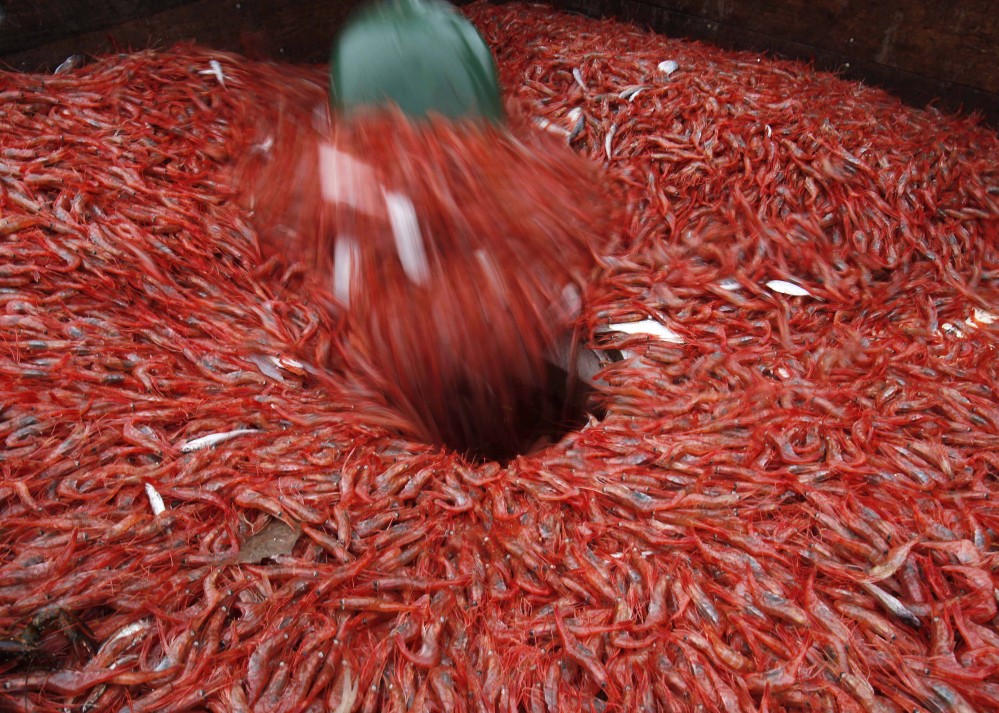Maine shrimp might come back on the market eventually but there could be fewer fishermen catching them.
Regulators are considering putting a limit on the number of fishermen who can participate in the Gulf of Maine’s beleaguered shrimp fishery in an attempt to revive the shuttered industry.
A board of the Atlantic States Marine Fisheries Commission is developing a proposal to control the number of fishermen who can fish for the shrimp that are prized for their sweet, tender meat. The plan will likely be the subject of public hearings next year, and could apply as soon as the 2017 fishing year, said commission spokeswoman Tina Berger.
The winter fishery, which formerly took place in the early months of the year, is currently shut down over concerns about low population, and fishermen haven’t been able to catch shrimp there since 2013.
Limiting access to the fishery is a subject of consternation in the industry, and some believe capping participation is unfair to younger fishermen who are trying to gain a foothold in the business. Others doubt that limiting the number of fishermen will effectively reduce the catch of shrimp and instead favor a shorter season or a low total catch limit.
But Gary Libby, a Port Clyde shrimp trawler and member of the shrimp board, said limiting the number of fishermen can halt the “gold rush” mentality that has impacted the shrimp fishery over the years. The number of boats in the fishery has varied greatly over the years, from nearly 400 in 1988 to less than 150 in 2006, largely because of the shrimps’ availability and fluctuating market price.
“If we don’t have that gold rush, maybe you don’t have the dips we’ve had in recent years,” Libby said. “I’m in favor of stability in the fishery.”
Patrick Keliher, commissioner of Maine’s Department of Marine Resources, does not support the idea, which he called “not the solution to controlling the shrimp harvest.”
Keliher added: “In fact it would just be another blow to those fishermen who traditionally held a diverse group of licenses, which is the historic nature of Maine’s commercial fisheries.”
Other fisheries impose similar limits on fishermen, however. Maine’s lobster fishery, for example, is limited access and the elver and scallop fisheries are “closed fisheries,” meaning there is a cap on new licenses.
Scientists have said rising temperatures in the Gulf of Maine are a threat to the shrimp, which are also sought by some fishermen from Massachusetts and New Hampshire. Maine’s catch of shrimp fell from nearly 5 million pounds in 2012 to less than 600,000 pounds in 2013.
Fishery managers also have to soon determine if there will be a shrimp fishery in the winter of 2016, and some say it looks unlikely. The shrimp board will consider the results of a recent survey at a meeting in November and could make a decision then.
Maggie Hunter, a member of the shrimp board’s technical committee, said the status of Maine shrimp remains poor.
“There just aren’t many medium sized shrimp that are coming along,” she said.
Send questions/comments to the editors.



Success. Please wait for the page to reload. If the page does not reload within 5 seconds, please refresh the page.
Enter your email and password to access comments.
Hi, to comment on stories you must . This profile is in addition to your subscription and website login.
Already have a commenting profile? .
Invalid username/password.
Please check your email to confirm and complete your registration.
Only subscribers are eligible to post comments. Please subscribe or login first for digital access. Here’s why.
Use the form below to reset your password. When you've submitted your account email, we will send an email with a reset code.